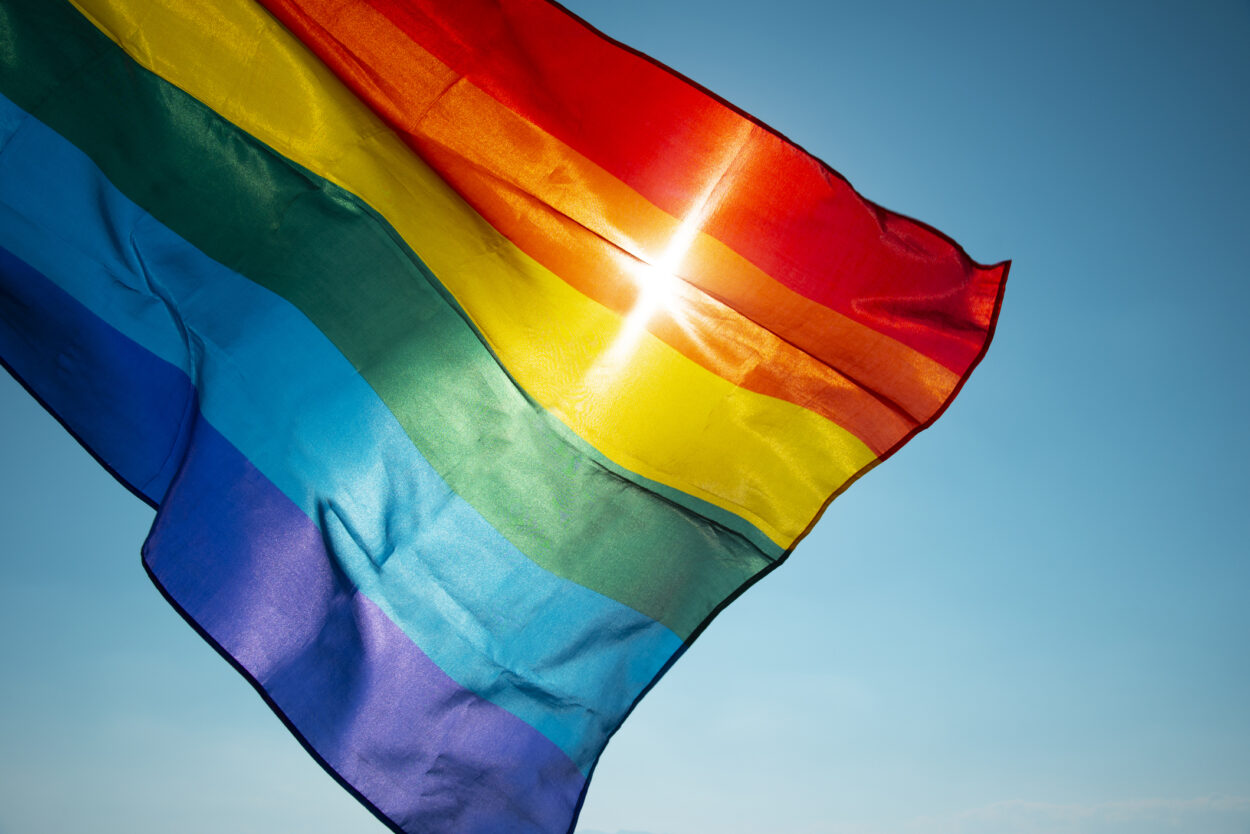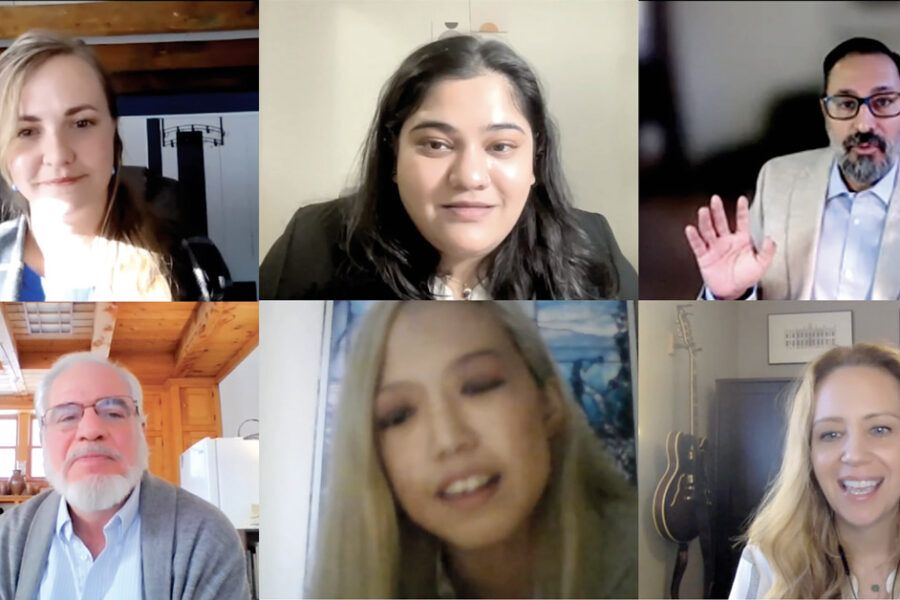The month of June is celebrated across the world as Pride Month, a time for all of us who are gay, lesbian, bisexual, transgender, queer, intersex, asexual, and our allies to celebrate our identities and come together for parades and celebrations that make us visible and assert our right to participate proudly and equally in public life. I invite you to learn more about the voices and contributions of some of your fellow LGBTQIA+ Antiochians by reading the many heartfelt essays written for our Antioch Voices series and Common Thread.
Across the U.S. this month, millions of people are participating in events around Pride, and it’s a wonderful reason to come together, make music, wear costumes, and have fun. It also provides an occasion to reflect on the strides that LGBTQIA+ folks have made over the last 53 years since the first Pride marches were held—and how far we still have to go as a nation to ensure that people of all genders and sexual identities are treated with equality and justice.
The first Pride marches were held in 1970 in several U.S. cities. The concept and the choice of month was a deliberate echo of the Stonewall Riots, which occurred a year earlier. Although the term “riot” does not actually capture what happened in Greenwich Village on June 28, 1969, in the aftermath of repeated police vice squad raidings of the Stonewall Inn, a place where the local LBGTQ community gathered to socialize free from the harassment they encountered in public. As Stormé DeLarverie, the Black lesbian credited with being the first to resist police that day later said, “It was a rebellion, it was an uprising, it was a civil rights disobedience—it wasn’t no damn riot.” From the start, Pride picked up where Stonewall left off, asserting the existence and dignity of LGBTQIA+ people in a society that uses laws and violence to marginalize and punish them.
Since then, the steps toward equality for LGBTQIA+ people have been significant, largely as the result of hard-fought battles in the U.S. Supreme Court. See, Lawrence v. Texas (2003), which struck down all state laws that criminalized consensual same-sex intimacy; United States v. Windsor (2013), which struck down those sections of the Defense of Marriage Act that allowed the states and the federal government to refuse to recognize lawful gay marriages from other jurisdictions; and Obergefell v. Hodges (2015), which ruled that states could not prohibit same-sex marriages within their states nor could they refuse to recognize same-sex marriages from other states.
Unfortunately, the work of liberation and claiming civil rights is not complete, and in fact today we can see backsliding of many of the gains that have been won over my lifetime. The current far-right majority of the Supreme Court has signaled their eagerness to revisit and reverse each of the above landmark decisions, as they did last year in Dobbs v. Jackson Women’s Health Organization reversing 50 years of precedent in Roe v. Wade. Additionally, the American Civil Liberties Union is tracking almost 500 anti-LGBTQIA+ bills in states across the country so far this year. I don’t have enough space here to explain every such bill being proposed and signed into law around our nation. But here are a few recent lowlights:
- Twenty states have banned the provision of gender-affirming care to people under 18, regardless of parental consent, while seven other states are considering such legislation. This treatment has been shown to save lives from suicide; depriving LGBTQIA+ youth of this healthcare guarantees the needless death of children.
- In Arkansas, a new law bans trans students from using public school bathrooms that match their gender identity. Five other states have passed such laws, and two dozen more so-called “bathroom bills” have been filed by Republicans in at least fifteen other states. Ostracizing trans youth in this way is nothing but harassment and creates social anguish while putting them directly in harm’s way.
- In Florida, new laws and policies on the books prevent public school teachers at all levels from teaching about the existence of LGBTQIA+ people. The so-called “Don’t Say Gay” laws have the intention of erasing these identities from public life.
- Another new Florida law bans minors from shows or reading hours where performers are wearing drag. A similar law in Tennessee was struck down last week after a judge ruled it violated First Amendment protections.
These laws have profound impacts on the humans they target: those who already find themselves marginalized by a society that has never fully stopped being hostile to LGBTQIA+ folks. And of course they most intensely impact those with intersectional identities (such as women, racial minorities, those living with disabilities, the unhoused, and the poor) who are subject to overlapping systems of oppression. These laws also embolden vigilante violence by right-wing extremists such as those terrorizing drag performances with AR-15 assault rifles.
While the right accuses the left of engaging in “wokeism” and “identity politics,” they are busy legislating against citizens based on their identities. They are masters at projecting their own intentions. So, make no mistake, LGBTQIA+ rights are human rights! We in the LGBTQIA+ community will not go back to being treated as “less than.” These laws are travesties. They should be struck down by the courts as unconstitutional. Barring that, there should be federal civil rights legislation that would preempt and override them and guarantee civil rights to all LGBTQIA+ Americans.
As I look at all these headlines, one thing that I can’t help but notice is the way that all of these laws seem focused on the performance of gender, and insist that gender be performed in the most traditional of ways. A recent example of the Republican obsession with traditional gender roles came up last month, when Senator Josh Hawley published a book titled Manhood: The Masculine Virtues America Needs. Hawley is most famous for raising a fist in solidarity with the insurrectionists on January 6, 2021, only to be seen on video hours later running from the Senate chamber in fear for his life. This book seems designed to lean into the cultural grievances that inspired that failed coup. The response from critics across the political spectrum has been withering. In Slate, Rebecca Onion said that, “like almost everything Hawley does, the book is an epic disaster,” while in the New York Times conservative columnist David French noted an irony in the fact that “the group that is most convinced of a crisis of masculinity, the American right, is also busy emasculating itself before our eyes.” Both make good points, but I think that Hawley’s focus on masculinity—and the targeting of trans people and drag performers in legislation across the country—are part of a larger strategy, and one that is to some degree working. They are changing the subject and throwing up smokescreens.
I think the comedian Wanda Sykes has it exactly right when she says, “Until a drag queen walks into a school and beats eight kids to death with a copy of To Kill A Mockingbird, I think you’re focusing on the wrong shit.” The fact is, an obsessive focus on gender and the villainization of trans people are wedge issues designed to distract and deflect from the real problems of our day. These politicians do everything they can to keep drag queens in the news, so that voters will remain distracted from the disastrous and escalating consequences of our insane gun laws, the efforts to roll back reproductive freedoms, the need to grapple with energy policy and climate change, their growing efforts to ban books they disagree with, and the widening seams of inequality that are rending the fabric of our nation.
Perhaps most importantly, the way these issues are framed seems intended to distract from the humanity of the LGBTQIA+ individuals who they directly impact. According to The Trevor Project’s 2021 National Survey on LGBTQ Youth Mental Health, 52 percent of LGBTQIA+ youth seriously considered attempting suicide in the past year. This is what we should be talking about and working to solve—not who uses what bathroom.
It is not the first time that revanchist forces have succeeded in rolling back the civil rights of newly enfranchised people, and just as in previous eras it is only the dedicated and passionate work of activists and teachers and protester—of true citizens—that will turn the tide. So I call on you to join me in celebrating Pride Month. Be proud; be brave; march and be vocal. I think it is all of our duty to pay attention to and resist this latest onslaught of bigotry, homophobia, and transphobia.
Together, we can continue building on the legacy of Stonewall. We can keep building a nation and world where all are protected by the law, and all feel proud to hold their heads high and share their identities, confident in their safety from arrest and violence, not just in June, but every day of the year.




